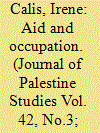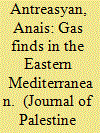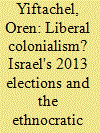|
|
|
Sort Order |
|
|
|
Items / Page
|
|
|
|
|
|
|
| Srl | Item |
| 1 |
ID:
128054


|
|
|
|
|
| Publication |
2013.
|
| Summary/Abstract |
This article foregrounds how international aid and the Israeli occupation intersect in the historically prosperous West Bank agricultural village of Jayyus; with most of its lands isolated behind the Israeli Wall, Jayyus is now aid-dependent. While material aid plays a larger role in sustaining the village, it is through "advocacy work" (a form of international aid largely unaddressed in the literature) that Jayyusis experience aid on a daily basis. The article examines the paradoxes of dependence and subordination seen from the vantage point of local communities under the jurisdiction of an occupying power and in the absence of a sovereign Palestinian state. Also shown is how the routinization of aid both obscures the ongoing status of occupation and has become an important mechanism that sustains it.
|
|
|
|
|
|
|
|
|
|
|
|
|
|
|
|
| 2 |
ID:
128055


|
|
|
|
|
| Publication |
2013.
|
| Summary/Abstract |
This article looks at the gas discoveries in the eastern Mediterranean since the late 1990s and how they have fueled-or otherwise intersected with-the various regional conflicts. About half of the article examines the fate of the 1999 gas discoveries off Gaza (within the maritime space set for the Palestinians by Oslo), and Israel's role in controlling the outcome. The other half is devoted, collectively, to the gas discoveries off Israel, Egypt, and Cyprus, as well as to the ensuing disputes and shifts of alliances involving these three states plus Lebanon and Turkey. Given the state of flux in the region, it is too soon to speculate on the ultimate geopolitical impact of the new finds.
|
|
|
|
|
|
|
|
|
|
|
|
|
|
|
|
| 3 |
ID:
128057


|
|
|
|
|
| Publication |
2013.
|
| Summary/Abstract |
Israel's 2013 Knesset elections, in which the incumbent ruling party was returned to power for the first time in a quarter-century, were noteworthy in several respects. The basic divisions of Israeli politics into geopolitical and socioeconomic blocs were unchanged, only small electoral shifts being registered. On the other hand, as this article shows, Prime Minister Benjamin Netanyahu barely achieved an electoral victory despite his overwhelming preponderance in public-opinion polls. Due to the rise of the new, personality-driven Yesh 'Atid party and the latter's unlikely alliance with the settler-based Jewish Home, which together garnered as many Knesset seats as the winning Likud-Yisrael Beitenu list, for the first time in decades Ultra-Orthodox parties were excluded from the winning governing coalitions for the first time in decades. The elections were marked by the near-invisibility of the Palestinian issue and Palestinian citizens of Israel. The article concludes that the continuing governing consensus in favor of "liberal colonialism" is unsustainable, although exploiting the "cracks" in that consensus is difficult and unlikely in the short term.
|
|
|
|
|
|
|
|
|
|
|
|
|
|
|
|
| 4 |
ID:
128064


|
|
|
|
|
| Publication |
2013.
|
| Summary/Abstract |
This essay on Ghassan Kanafani-militant, political writer and essayist, literary innovator, and preeminent Palestinian novelist-is another in what JPS hopes will become an ongoing, if occasional, series foregrounding individuals (some known, others unknown to the outside world or forgotten) who embody some dimension of the Palestinian Resistance in the early years of its existence. Several such pieces have appeared in recent issues of JPS, notably "Two Portraits in Resistance," commemorating two remarkable figures who left other lives to serve the movement, published in JPS 164, and the landmark 1996 interview with Palestinian poet Mahmoud Darwish, published in JPS 165.
Though less of a household name than the slightly younger Darwish, Kanafani, assassinated in 1972 at age thirty-six by a Mossad bomb planted in his automobile, was known during his lifetime in almost equal measure for his political work and writings and for the novels and short stories that today constitute his enduring legacy. In this evocative remembrance of Kanafani written on the fortieth anniversary of his death, Lebanese novelist Elias Khoury treats the two strands, literary and revolutionary, as inextricably intertwined, two sides of the same coin. The piece was originally published in Arabic in JPS's sister publication, Majallat al-Dirasat al-Filastiniyya, no. 92, autumn 2012, and translated for JPS by Maia Tabet.
|
|
|
|
|
|
|
|
|
|
|
|
|
|
|
|
| 5 |
ID:
128063


|
|
|
|
|
| Publication |
2013.
|
| Summary/Abstract |
Commonly law is seen as an alternative to violence, although it relies on violence or its threat for enforcement. Through a study of Israel's campaign to transform international humanitarian law (IHL) by systematically violating it, this essay considers the possibility that violence precedes and even creates law. Israel has a long history of ad hoc "legal entrepreneurialism," but its current effort, launched during the second intifada, is institutionalized, persistent, and internally coherent. The essay reviews the specific legal innovations Israel has sought to establish, all of which expand the scope of "legitimate" violence and its targets, contrary to IHL's fundamental purposes of limiting violence and protecting non-combatants from it.
|
|
|
|
|
|
|
|
|
|
|
|
|
|
|
|
|
|
|
|
|